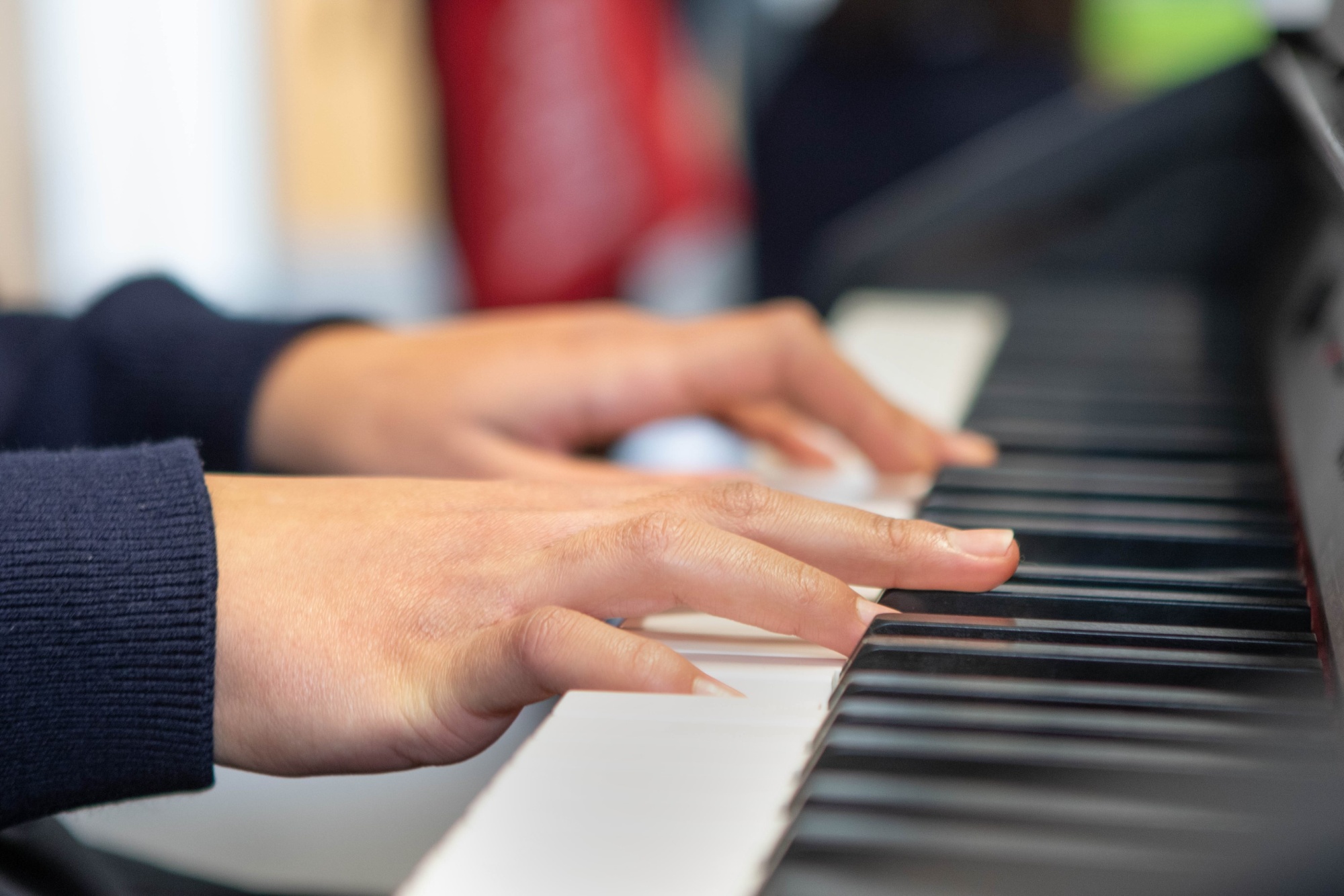Music

Subject Leader: Mr Arash Shokouhi
To give the students a lifelong love of Music and the arts, which will see them pursue careers or hobbies in a creative field.
By the end of KS3, students should have experience on a variety of instruments and technologies, which will prepare them for KS4 whilst allowing them to find something they love doing.
By the end of KS4, students should have the opportunity to explore technology and their chosen instruments in various musical genres & contexts, whilst being able to utilise analytical skills to enable them to pursue music in KS5 and beyond.
Music Development Plan
Part A: Curriculum music
Reading Girls’ School has a well-structured music curriculum that spans Key Stages 3 and 4. In Key Stage 3 (Years 7-8), pupils receive music lessons twice a fortnight, with each unit running for 6-7 weeks. The curriculum covers a range of musical elements, genres, and practical skills, including the study of instruments, music production, and musical futures. Pupils engage in solo and group performances, as well as individual listening tests at the end of each unit. The school also utilises Independent Learning Projects (ILPs) to allow pupils to record performances or create presentations, supporting their creative development.
In Key Stage 4 (Years 9-11), pupils study music technology, performance, and analysis across various genres, with a focus on preparing them for further music education. The school's curriculum is designed to be inclusive, supporting pupils with SEND through differentiated tasks and support materials.
Potential next steps:
-
Consider introducing opportunities for pupils to compose their own music, building on the technical and constructive skills developed in the curriculum.
-
Explore ways to incorporate more cross-curricular links and real-world applications of music, enhancing the relevance and engagement for pupils.
-
Investigate the feasibility of increasing curriculum time for music, aligning with the Model Music Curriculum's recommendation of at least one hour per week.
Part B: Co-curricular music
Reading Girls’ School is committed to expanding its co-curricular music provision to provide a well-rounded musical education for its pupils. The school plans to offer instrumental and vocal tuition, both in one-to-one and small group settings, across a variety of instruments and voices. Additionally, the school aims to form a school choir/vocal ensemble and instrumental group, providing ensemble performance opportunities for pupils.
To support these musical activities, the school will make dedicated rehearsal spaces available for rehearsals and individual practice. Further, the school is exploring plans to introduce instrument loan schemes, Saturday music centres, and subsidised tuition for eligible pupils, ensuring equal access and progression opportunities for all.
The school will provide further details on the co-curricular music provision, including charges and remissions policies, as the plans develop.
Potential next steps:
-
Investigate the possibility of establishing partnerships with local music hubs or organisations to expand the range of instrumental and vocal tuition offered.
-
Consider implementing a structured progression pathway for pupils, with clear milestones and opportunities for advanced ensemble participation or leadership roles.
-
Explore ways to promote the co-curricular music provision, potentially through taster sessions or showcases, to engage a wider range of pupils and increase participation.
Part C: Musical experiences
Reading Girls’ School is committed to providing its pupils with a range of meaningful musical experiences throughout the school year. The school plans to host termly performances, such as concerts and shows, which will offer valuable performance opportunities for pupils. Additionally, the school will organise annual trips for pupils to attend live music performances, exposing them to professional-level music and broadening their musical horizons.
To further integrate music into the school community, the school will incorporate regular musical involvement through singing assemblies and school events. The school will provide details on how pupils can participate in these musical experiences, and any associated costs, in advance. Subsidies will be available for pupils eligible for pupil premium, ensuring equal access to these opportunities.
1 to 1 with a Music Maestro
Reading Girls school is in partnership with Berkshire music Trust, the scheme offers a wide range of 1 to 1 music lessons (10 minutes to 45 minutes long) within school hours that cater to students of all ages and skill levels, providing them with a valuable opportunity to develop their musical abilities on various instruments. The lessons are designed to foster growth, creativity, and technical proficiency, allowing students to build a strong foundation in music while also exploring their personal musical interests.
Personalised Music Instruction
Berkshire Music Trust’s experienced and passionate instructors tailor each lesson to the individual needs of the student. Whether you’re a beginner or an advanced player, the lessons will be adapted to meet your current level and help you progress at your own pace. Teachers focus on fostering both technical skill and musical expression, ensuring that students not only improve their proficiency but also develop a deeper appreciation for music.
Instrumental Skill Development
Students will have the opportunity to enhance their skills on a variety of instruments, including piano, guitar, strings, brass, woodwinds, and percussion. Lessons will cover important aspects such as:
-
Technique: Building proper hand positioning, posture, and finger placement.
-
Sight Reading: Learning to read and interpret musical notation.
-
Music Theory: Understanding the fundamentals of scales, chords, and musical structure.
-
Rhythm and Timing: Developing a strong sense of rhythm and mastering complex time signatures.
Potential next steps:
-
Explore the possibility of establishing artist-in-residence or musician-in-residence programmes, where professional musicians or composers work with pupils to create and perform original music.
-
Consider organising masterclasses or workshops by visiting musicians or music professionals to provide pupils with unique learning experiences.
-
Investigate ways to involve the local community in the school's musical events, such as inviting parents or community members to attend performances or participate in workshops.
Additional Support Available/Useful Links
Reading List
- Forming a Band (Paperback)
- Recording and Promoting Your Music (Paperback)
- The Impact of Technology in Music (Hardback)
